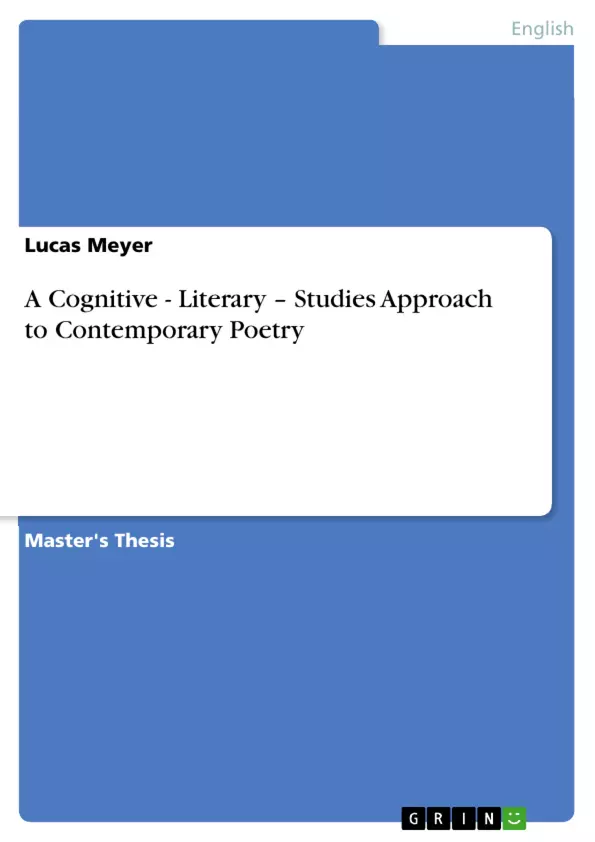Lyric theory polarises the narratological complexities of the text on the one hand and the epideictic echo into the empirical reality on the other. Through this divergence, the transformative urge expressed in the poems is circumvented. The description of the transformative function of poetry, which consists of the fusion of enounced and enunciation, demands and enables the convergence of the epideictic quality of the lyric and the narratological mechanisation of poetry. The crucial link for the convergence of lyric theoretical discourses is the framework of cognitive schemata. This cognitive approach identifies the text, language, and world knowledge by scrutinising the schemata and frames of a poem. The approach transforms the strands of lyric theory to focus on the modulating capacity of a poem by engaging the reader’s cognitive process and thus articulating the transformative function of the text for that reader. Catalysing the narratological and epideictic theories of the lyric with the cognitive – literary – studies approach enables a framework that distinguishes a fragmentary and heuristic construction, classifies the modulation kinds of accretion, tuning or restructuring and therewith articulates the transformative function of early 21st century crisis poetry.
The paper begins with section 2. Lyric Theory, which links the theories of poetry to the cognitive approach and creates a corpus of early 21st poetry that illustrates the suitability of this analysis. Subsequently, the cognitive method is discussed in more detail in section 3. Transformative Function Methodology. The main section 4. Schema and Frame analysis of Contemporary Crisis Poetry focuses on the application of the theory to model examples and presents the results of the cognitive method for the corpus of early 21st century crisis poetry. Finally, section 5. Conclusion provides a summary and discusses limitations and prospects.
Inhaltsverzeichnis (Table of Contents)
- 1. Introduction: Cognitive Lyrics
- 2. Lyric Theory
- 2.1. Simultaneous Theories of the Lyric
- 2.2. Contemporary Crisis Poetry
- 3. Transformative Function Methodology
- 3.1. Cognitive Schemata
- 3.2. The Schema and Frame of Poetry
- 3.3. Theoretical Convergence
- 4. Schema and Frame analysis of Contemporary Crisis Poetry
- 4.1. Heuristic construction
- 4.2. Fragmentary construction
- 4.3. Cases of Complications
- 5. Conclusion
Zielsetzung und Themenschwerpunkte (Objectives and Key Themes)
This Master Thesis explores the transformative function of contemporary poetry by applying a cognitive-literary studies approach. The study seeks to bridge the gap between traditional lyric theories that focus on either narratological complexities or empirical reality, demonstrating the merits of a cognitive analysis for understanding how contemporary poetry engages with and influences readers.
- Cognitive Schemata and Frames in Poetry Analysis
- The Transformative Function of Contemporary Crisis Poetry
- The Social and Cultural Context of Early 21st Century Poetry
- The Interplay of Narratological and Epideictic Elements in Lyric Theory
- The Role of Poetry in Addressing Contemporary Crises
Zusammenfassung der Kapitel (Chapter Summaries)
- Chapter 1: Introduction: Cognitive Lyrics - This chapter introduces the thesis's main objective, which is to explore the transformative function of early 21st century poetry using a cognitive approach. It highlights the rise of poetry in contemporary culture and its focus on crisis themes, and discusses the limitations of traditional lyric theories in understanding this phenomenon. The chapter also introduces the cognitive schemata framework as a potential solution for bridging the gap between different theoretical perspectives.
- Chapter 2: Lyric Theory - This chapter delves into the strengths and limitations of traditional lyric theories. It examines how the theory of the lyric by Jonathan D. Culler emphasizes the epideictic quality of poetry and its connection to empirical reality. It also explores the cognitive approach to literature and its potential for understanding the social and cultural functions of poetry.
- Chapter 3: Transformative Function Methodology - This chapter introduces the cognitive schemata framework and its application to poetry analysis. It explains how this approach can coordinate different theoretical perspectives by focusing on the text, language, and world knowledge of a poem. It also discusses how cognitive schemata can be used to identify the transformative function of poetry for the reader.
- Chapter 4: Schema and Frame analysis of Contemporary Crisis Poetry - This chapter applies the cognitive schemata framework to a corpus of early 21st century crisis poetry. It examines the different types of schemas and frames used in these poems and how they activate the reader's cognitive processes. It also discusses the results of the analysis and its implications for understanding the transformative function of contemporary poetry.
Schlüsselwörter (Keywords)
The main keywords and focus topics of this thesis include cognitive literary studies, contemporary poetry, crisis themes, transformative function, cognitive schemata, lyric theory, narratological analysis, epideictic poetry, and early 21st century cultural context.
Frequently Asked Questions
What is the "Transformative Function" of poetry?
It refers to how poetry can modulate a reader's cognitive process, leading to a restructuring or tuning of their world knowledge and perceptions.
How does the cognitive approach differ from traditional lyric theory?
Instead of focusing solely on narratology or empirical reality, the cognitive approach scrutinizes the "schemata" and "frames" within a poem to understand the reader's engagement.
What is "Crisis Poetry"?
It refers to poetry from the early 21st century that addresses contemporary social, cultural, or political crises through fragmentary and heuristic constructions.
What are "Cognitive Schemata" in literature?
They are mental structures that help readers categorize and interpret information based on previous knowledge and cultural context.
What role does Jonathan D. Culler play in this study?
Culler's theories on the epideictic quality of the lyric are used as a counterpoint or catalyst for the cognitive-literary framework proposed.
- Citar trabajo
- Lucas Meyer (Autor), 2023, A Cognitive - Literary – Studies Approach to Contemporary Poetry, Múnich, GRIN Verlag, https://www.grin.com/document/1389637



